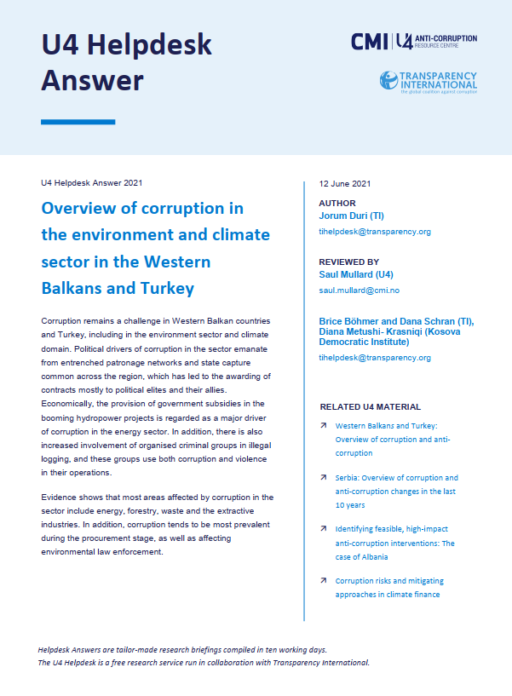- Home
- Anti-Corruption Helpdesk
- Overview of corruption in the environment and climate sector in the Western Balkans and Turkey
Overview of corruption in the environment and climate sector in the Western Balkans and Turkey

This Anti-Corruption Helpdesk brief was produced in response to a query from a U4 Partner Agency. The U4 Helpdesk is operated by Transparency International in collaboration with the U4 Anti-Corruption Resource Centre based at the Chr. Michelsen Institute.
Query
Please provide an overview of the drivers of corruption in the environment and climate sector in the Western Balkans and Turkey, as well as the areas most affected by corruption. In addition, what are the measures mitigating corruption in the sector, and which organisations are involved?
Summary
Corruption remains a challenge in Western Balkan countries and Turkey, including in the environment sector and climate domain. Political drivers of corruption in the sector emanate from entrenched patronage networks and state capture common across the region, which has led to the awarding of contracts mostly to political elites and their allies. Economically, the provision of government subsidies in the booming hydropower projects is regarded as a major driver of corruption in the energy sector. In addition, there is also increased involvement of organised criminal groups in illegal logging, and these groups use both corruption and violence in their operations.
Evidence shows that most areas affected by corruption in the sector include energy, forestry, waste and the extractive industries. In addition, corruption tends to be most prevalent during the procurement stage, as well as affecting environmental law enforcement
Contents
1. Introduction
2. Drivers of corruption in the environment and climate sector in the Western Balkans and Turkey
3. Areas in the sector most affected by corruption
4. Measures to mitigate corruption in the sector
5. Organisations working on environmental issues and corruption in the sector
6. References
Main points
— In 2016, Western Balkan countries and Turkey had an average Corruption Perceptions Index (CPI) score of 39.8 out of 100 – which then dropped to 37.8 in 2020 – indicating an increase in public sector corruption
— Patronage networks deeply entrenched in political systems across the region have resulted in the corrupt awarding of contracts in the environment and climate sector to political elites and their allies
— Poor governance around subsidies allocations in hydropower projects across the region exacerbated corruption in the energy sector, and evidence shows that most contracts are awarded to politically connected persons who are making huge profits from the subsidies
— Evidence shows that most areas affected by corruption in the sector include energy, forestry, waste and extractives. In addition, corruption tends to be prevalent during the procurement stage, as well as in environmental law enforcement.
Authors
Jorum Duri, [email protected]
Reviewers
Saul Mullard (U4 Anti-Corruption Resource Centre)
Brice Böhmer and Dana Schran (Transparency International), Diana Metushi- Krasniqi (Kosova Democratic Institute)
Date
05/07/2021
Tags
 Download PDF
Download PDF
